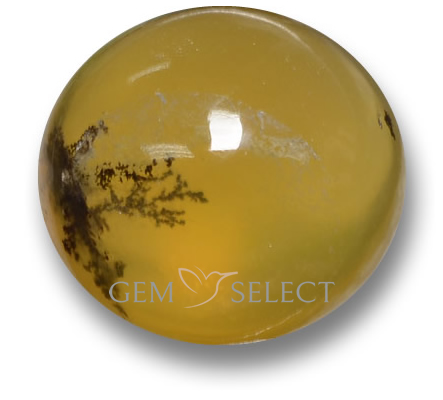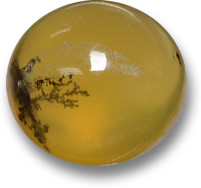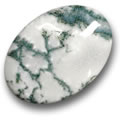Moss Opal Gemstone Information

About Moss Opal - History and Introduction
Moss opal is a milky white to brownish opal featuring dark greenish inclusions that look just like moss. You might also hear it called "dendritic opal" because those tree-like patterns, or "dendrites," come from the Greek word for "tree." It's fascinating how nature creates these intricate designs inside the stone.
The term "opal" likely stems from the Sanskrit word "upala," which means "precious stone." Opals have been prized as gemstones for ages and were even thought to hold supernatural powers. Back in the Middle Ages, people considered opal a lucky charm - some believed wrapping it in a bay leaf could make you invisible! By definition, opal is hydrated silicon dioxide, containing anywhere from three to thirty percent water. That water content, combined with its softness - rating 5.5 to 6.5 on the Mohs scale - means you'll want to handle it with care to keep it looking its best. Discover detailed opal gemstone facts and history.

Identifying Moss Opal
Moss opal stands out with its milky white to brownish hue and those signature dark-green moss-like inclusions, usually caused by hornblende. It's pretty straightforward to spot once you know what to look for.
Moss Opal Origin and Gemstone Sources
Australia dominates the opal market, producing about 95 percent of the world's white precious opal. Key spots include Lightning Ridge and White Cliffs in New South Wales, plus Coober Pedy and Andamooka in South Australia. Queensland has its share too. Beyond Australia, you'll find deposits in Brazil, Guatemala, Honduras, Indonesia, Japan, Mexico, Russia, and the United States - specifically in Idaho and Nevada.
Buying Moss Opal and Determining Moss Opal Gemstone Value
Moss Opal Color
Unlike some opals that flash with color play, moss opal keeps it subtle. Its body features dark green moss-like patterns against a milky white to brownish background. The most sought-after ones have that clean milky white base with vivid contrasting inclusions.
Moss Opal Clarity and Luster
This gem is typically opaque, though rarely it can be translucent. Its shine is usually glassy, but sometimes pearly or waxy. Those dark-greenish, mossy dendrites are what make it special - they're the desirable inclusions here.
Moss Opal Cut and Shape
Because it's opaque, moss opal is often cut as cabochons or rounds. It might also be tumbled, given fancy shapes, or drilled for jewelry.
Moss Opal Treatment
Sometimes moss opal gets impregnated with oil, wax, or plastic to enhance it, but you can still find untreated natural pieces out there.
Moss Opal Gemological Properties
| Chemical Formula: | SiO2 _nH2O Hydrous silicon dioxide |
| Crystal Structure: | Amorphous; kidney-shaped or grape-shaped aggregates |
| Color: | Milky-white to brownish with dark-greenish inclusions |
| Hardness: | 5.5 - 6.5 on the Mohs scale |
| Refractive Index: | 1.37 - 1.52 |
| Density: | 1.98 - 2.50 |
| Cleavage: | None |
| Transparency: | Transparent, opaque |
| Double Refraction or Birefringence: | None |
| Luster: | Usually vitreous, but can also be pearly or waxy |
| Fluorescence: | White, bluish, brownish, greenish |
Please refer to our Gemstone Glossary for details of gemology-related terms.
Moss Opal Gemstone Mythology, Metaphysical and Healing Powers
Opal has been cherished for its supposed healing properties over centuries. In medieval times, it symbolized luck, with tales of it granting invisibility when wrapped in a bay leaf. It's said to ease depression, help find true love, and serves as the birthstone for October babies. Specifically, moss opal is thought to help fulfill desires, aid in past-life recovery, and support spiritual growth. Some believe it benefits circulatory issues too. Isn't it intriguing how gems carry such rich lore?
Disclaimer: Metaphysical and Alternative Crystal Healing Powers and Properties are not to be taken as confirmed advice. Traditional, Ceremonial and Mythological Gemstone Lore is collected from various resources and does not represent the sole opinion of SETT Co., Ltd. This information is not to replace the advice of your doctor. Should you have any medical conditions, please see a licensed medical practitioner. GemSelect does not guarantee any claims or statements of healing or astrological birthstone powers and cannot be held liable under any circumstances.
Moss Opal Gemstone and Jewelry Design Ideas
Moss opals shine in earrings, brooches, and pendants. Given their delicacy, they're not ideal for everyday rings or items that take a beating. Drill them for pendants or earrings, or bezel-set and wire-wrap for occasional rings, bracelets, or necklaces. Tumbled ones make great beads too.
Note: Buy colored gemstones by size and not by carat weight. Colored stones vary in size-to-weight ratio. Some stones are larger and others are smaller than diamonds by weight in comparison.
Famous Moss Opal Gemstones
While moss and common opals haven't hit the headlines, other opals have. Take "The Olympic Australis Opal," dug up in Coober Pedy, Australia, in 1956 - it weighs 17,000 carats and was valued at $2,500,000 Australian dollars in 2005. "The light of the world," a 40-gram, 2,250-carat white precious opal from Australia, is famed for its colors. And the "Andamooka Desert Flame," found in 1969 at 6,843 kilograms, is the biggest opal ever discovered.
Moss Opal Gemstone Jewelry Care and Cleaning

Moss opals are delicate due to their water content - if they dry out, they can crack and lose their vibrancy. In dry climates or dehumidified spaces, store them in a sealed plastic bag with a damp cloth to keep moisture in. They're sensitive to temperature swings too. Being softer, they scratch easily, especially from dust which contains quartz. Just wipe them with a soft cloth to maintain the polish.
Avoid ultrasonic cleaners and steamers like with most gems. Remove jewelry before cleaning or sports. Store opals separately to prevent scratches, wrapped in soft cloth or in a fabric-lined box. Learn essential care tips for opal gemstones.
Frequently Asked Questions
What is moss opal?
Moss opal is a type of opal with a milky white to brownish base and dark green inclusions that resemble moss or tree branches.
Where does moss opal come from?
Most opal, including moss varieties, comes from Australia, but deposits exist in Brazil, Mexico, the US, and other places.
How do I care for moss opal jewelry?
Keep it moist to prevent cracking, clean with a soft cloth, and avoid harsh cleaners or extreme temperatures.
Is moss opal treated?
It can be impregnated with oil, wax, or plastic, but natural untreated moss opal is also available.
What are the metaphysical properties of moss opal?
It's believed to aid in spiritual growth and fulfilling desires, but remember, these are traditional beliefs and not scientifically proven.


